The PC industry has committed a great many crimes against fashion and design. For years, PCs were little more than bland, beige boxes with all the aesthetic appeal of a mid-80s K-Car. Almost entirely devoid of distinctiveness, these so-called clones made the desktop landscape look like an endless subdivision of stuccoed sameness. No wonder folks thought PCs were boring.
In response to this abject dullness, enthusiasts and the companies that targeted them decided to walk a different path. Think Pimp My Ride, but with computers... and very little restraint. Before long, high-end PCs were lit up with more neon than a seedy porno district. They pulsed with the seizure-inducing strobing of LED-bedazzled fans and glowed with enough UV-reactive elements to fill a teenage stoner's bedroom. That's great if you take your stylistic cues from The Fast and the Furious, but it's a little gaudy for the rest of us.
Apparently, notebook makers figured the rest of us wanted glossy plastics. You know, the kind that look all nice and shiny when buffed up on retail shelves and in promotional pictures. The very same that instantly pick up a mess of fingerprints and smudges, even when caressed with hands obsessively sanitized in fear of the next global pandemic. Glossy plastic doesn't look that bad if it goes untouched after polishing, but for notebooks that tend to be handled constantly, it's an epic failure of design.
Artistic merit tends to count for more with laptops because they can't be tucked discretely under a desk or otherwise hidden from view. In fact, for many users, notebooks have started to replace desktops entirely. Even for those of us with powerful desktops, portable PCs have become almost omnipresent accessories. They should look good, and precious few do.
I suppose that's why I was so impressed with Asus' collection of bamboo-infused notebooks when the company revealed a series of new designs at the Consumer Electronics Show last year. Asus had done bamboo before in the U2E and U6V, but those were premium notebooks that debuted with price tags hovering around $2000. The new bamboo treatment on display at CES was coming to more affordable systems, and it arrived in our labs wrapped around a 13.3-inch" U33Jc that sells for only a grand. That's not bad for a thin-and-light system with a Core i3 CPU, Optimus graphics, and USB 3.0 connectivity. And one thing is guaranteed: no other notebook in its class looks quite like the U33Jc.
 Obviously, bamboo is the star of the show here. Versions of Asus' U2E and U6V ultraportables have been available with bamboo accents for quite some time, and for them, a labor-intensive process was used to bond bamboo to plastic panels. According to Asus, this process required a lengthy cure time for the adhesive to set, and the results weren't always consistent.
Obviously, bamboo is the star of the show here. Versions of Asus' U2E and U6V ultraportables have been available with bamboo accents for quite some time, and for them, a labor-intensive process was used to bond bamboo to plastic panels. According to Asus, this process required a lengthy cure time for the adhesive to set, and the results weren't always consistent.
For its new bamboo series, Asus experimented with several different methods before settling on a "3D in-mold decoration" technique that combines an ABS plastic frame, a non-woven geotextile base material, and bamboo sheets just 0.16-0.45 millimeters thick. These elements are bonded together, and a surface coating provides a measure of protection for the bamboo outer layer.
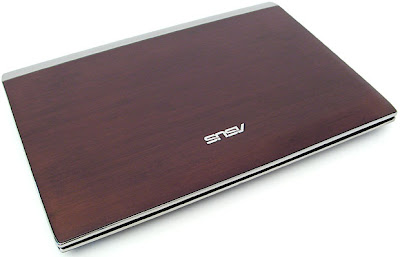 Perhaps due to the subtle sheen imparted by the surface treatment used, the bamboo panels look a little more like laminate flooring than real wood. The grain still comes across nicely through the smooth top coat, but the color isn't quite right for something that's supposed to look like bamboo. Asus' marketing slides officially refer to the tone as "smoky brown bamboo," and it's much darker than the more traditional shade seen on the U2E and U6V.
Perhaps due to the subtle sheen imparted by the surface treatment used, the bamboo panels look a little more like laminate flooring than real wood. The grain still comes across nicely through the smooth top coat, but the color isn't quite right for something that's supposed to look like bamboo. Asus' marketing slides officially refer to the tone as "smoky brown bamboo," and it's much darker than the more traditional shade seen on the U2E and U6V.
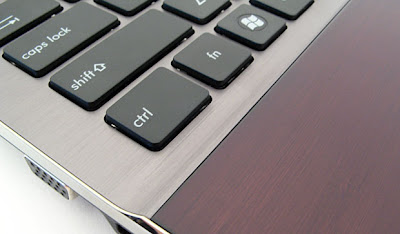 I'd prefer a lighter, more authentic hue, but the richness of the darker wood does add a measure of old-world charm. Combined with copious amounts of brushed aluminum, the pseudo-mahogany paneling reminds me of the dashboard of a Jaguar or an Aston Martin: luxurious and high-tech at the same time.
I'd prefer a lighter, more authentic hue, but the richness of the darker wood does add a measure of old-world charm. Combined with copious amounts of brushed aluminum, the pseudo-mahogany paneling reminds me of the dashboard of a Jaguar or an Aston Martin: luxurious and high-tech at the same time.
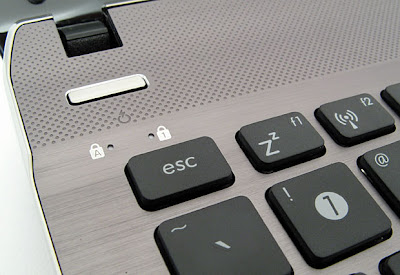 The muted grains of the wood and metal play off each other nicely without being too busy. I'm a total sucker for brushed aluminum finishes, but there's a certain sterility and coldness to all-metal designs. On the U33Jc, the wood adds a measure of warmth that definitely softens the overall look and feel of the system.
The muted grains of the wood and metal play off each other nicely without being too busy. I'm a total sucker for brushed aluminum finishes, but there's a certain sterility and coldness to all-metal designs. On the U33Jc, the wood adds a measure of warmth that definitely softens the overall look and feel of the system.
Speaking of feel, laying your mitts all over the U33Jc won't impart a mess of smudges and fingerprints. Greased up digits fresh from a bucket of the Colonel's Original Recipe will still leave their mark, but the aluminum and wood surfaces tolerate handling much better than glossy and polished plastics.
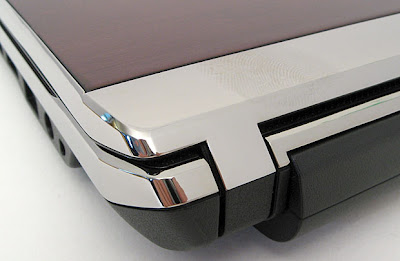 Unfortunately, Asus couldn't resist the lure of gloss completely. A faux-chrome band runs around the edge of the system and easily picks up fingerprints, one of which you can see illustrated above. The very same finger left no lasting evidence on either the brushed aluminum or bamboo panels.
Unfortunately, Asus couldn't resist the lure of gloss completely. A faux-chrome band runs around the edge of the system and easily picks up fingerprints, one of which you can see illustrated above. The very same finger left no lasting evidence on either the brushed aluminum or bamboo panels.
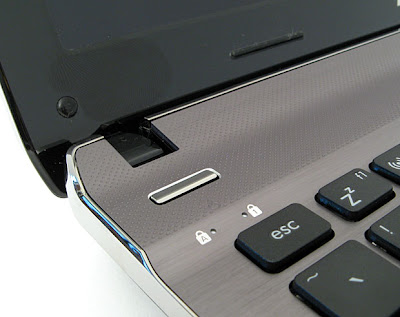 Because the chrome is largely limited to thin strips in areas that aren't manhandled constantly, smudges on the mirror-like finish aren't as obvious with day-to-day usage. However, the same can't be said for the glossy black plastic that rings the screen. The bezel that gets touched each and every time the U33Jc is opened is a fingerprint magnet, and when the laptop's open, all those smudges are right in front of you.
Because the chrome is largely limited to thin strips in areas that aren't manhandled constantly, smudges on the mirror-like finish aren't as obvious with day-to-day usage. However, the same can't be said for the glossy black plastic that rings the screen. The bezel that gets touched each and every time the U33Jc is opened is a fingerprint magnet, and when the laptop's open, all those smudges are right in front of you.
Fortunately, the unsightly blemishes that accumulate on the U33Jc's few glossy elements don't ruin the overall look of the laptop. I only point them out because they're in stark contrast with the rest of the system's surfaces, which are much more resilient.
Asking Taiwanese notebook makers to drop glossy plastics completely is like trying to get Amy Winehouse to go cold turkey. Ain't gonna happen. But Asus appears to have gone to rehab, and it apparently came back inspired. You might not like the wood and aluminum combo, but there's no denying that Asus has realized a unique design with the U33Jc. I think it looks gorgeous.
Other types of Asus :
ASUS G73JW-A1 Gaming Laptops
Asus Eee Pad Transformer Rerview
Asus Eee PC 1015B and 1215B "New laptop Review"
Source : [http://techreport.com/articles.x/19449]
In response to this abject dullness, enthusiasts and the companies that targeted them decided to walk a different path. Think Pimp My Ride, but with computers... and very little restraint. Before long, high-end PCs were lit up with more neon than a seedy porno district. They pulsed with the seizure-inducing strobing of LED-bedazzled fans and glowed with enough UV-reactive elements to fill a teenage stoner's bedroom. That's great if you take your stylistic cues from The Fast and the Furious, but it's a little gaudy for the rest of us.
Apparently, notebook makers figured the rest of us wanted glossy plastics. You know, the kind that look all nice and shiny when buffed up on retail shelves and in promotional pictures. The very same that instantly pick up a mess of fingerprints and smudges, even when caressed with hands obsessively sanitized in fear of the next global pandemic. Glossy plastic doesn't look that bad if it goes untouched after polishing, but for notebooks that tend to be handled constantly, it's an epic failure of design.
Artistic merit tends to count for more with laptops because they can't be tucked discretely under a desk or otherwise hidden from view. In fact, for many users, notebooks have started to replace desktops entirely. Even for those of us with powerful desktops, portable PCs have become almost omnipresent accessories. They should look good, and precious few do.
I suppose that's why I was so impressed with Asus' collection of bamboo-infused notebooks when the company revealed a series of new designs at the Consumer Electronics Show last year. Asus had done bamboo before in the U2E and U6V, but those were premium notebooks that debuted with price tags hovering around $2000. The new bamboo treatment on display at CES was coming to more affordable systems, and it arrived in our labs wrapped around a 13.3-inch" U33Jc that sells for only a grand. That's not bad for a thin-and-light system with a Core i3 CPU, Optimus graphics, and USB 3.0 connectivity. And one thing is guaranteed: no other notebook in its class looks quite like the U33Jc.
 Obviously, bamboo is the star of the show here. Versions of Asus' U2E and U6V ultraportables have been available with bamboo accents for quite some time, and for them, a labor-intensive process was used to bond bamboo to plastic panels. According to Asus, this process required a lengthy cure time for the adhesive to set, and the results weren't always consistent.
Obviously, bamboo is the star of the show here. Versions of Asus' U2E and U6V ultraportables have been available with bamboo accents for quite some time, and for them, a labor-intensive process was used to bond bamboo to plastic panels. According to Asus, this process required a lengthy cure time for the adhesive to set, and the results weren't always consistent.For its new bamboo series, Asus experimented with several different methods before settling on a "3D in-mold decoration" technique that combines an ABS plastic frame, a non-woven geotextile base material, and bamboo sheets just 0.16-0.45 millimeters thick. These elements are bonded together, and a surface coating provides a measure of protection for the bamboo outer layer.
 Perhaps due to the subtle sheen imparted by the surface treatment used, the bamboo panels look a little more like laminate flooring than real wood. The grain still comes across nicely through the smooth top coat, but the color isn't quite right for something that's supposed to look like bamboo. Asus' marketing slides officially refer to the tone as "smoky brown bamboo," and it's much darker than the more traditional shade seen on the U2E and U6V.
Perhaps due to the subtle sheen imparted by the surface treatment used, the bamboo panels look a little more like laminate flooring than real wood. The grain still comes across nicely through the smooth top coat, but the color isn't quite right for something that's supposed to look like bamboo. Asus' marketing slides officially refer to the tone as "smoky brown bamboo," and it's much darker than the more traditional shade seen on the U2E and U6V. I'd prefer a lighter, more authentic hue, but the richness of the darker wood does add a measure of old-world charm. Combined with copious amounts of brushed aluminum, the pseudo-mahogany paneling reminds me of the dashboard of a Jaguar or an Aston Martin: luxurious and high-tech at the same time.
I'd prefer a lighter, more authentic hue, but the richness of the darker wood does add a measure of old-world charm. Combined with copious amounts of brushed aluminum, the pseudo-mahogany paneling reminds me of the dashboard of a Jaguar or an Aston Martin: luxurious and high-tech at the same time. The muted grains of the wood and metal play off each other nicely without being too busy. I'm a total sucker for brushed aluminum finishes, but there's a certain sterility and coldness to all-metal designs. On the U33Jc, the wood adds a measure of warmth that definitely softens the overall look and feel of the system.
The muted grains of the wood and metal play off each other nicely without being too busy. I'm a total sucker for brushed aluminum finishes, but there's a certain sterility and coldness to all-metal designs. On the U33Jc, the wood adds a measure of warmth that definitely softens the overall look and feel of the system.Speaking of feel, laying your mitts all over the U33Jc won't impart a mess of smudges and fingerprints. Greased up digits fresh from a bucket of the Colonel's Original Recipe will still leave their mark, but the aluminum and wood surfaces tolerate handling much better than glossy and polished plastics.
 Unfortunately, Asus couldn't resist the lure of gloss completely. A faux-chrome band runs around the edge of the system and easily picks up fingerprints, one of which you can see illustrated above. The very same finger left no lasting evidence on either the brushed aluminum or bamboo panels.
Unfortunately, Asus couldn't resist the lure of gloss completely. A faux-chrome band runs around the edge of the system and easily picks up fingerprints, one of which you can see illustrated above. The very same finger left no lasting evidence on either the brushed aluminum or bamboo panels. Because the chrome is largely limited to thin strips in areas that aren't manhandled constantly, smudges on the mirror-like finish aren't as obvious with day-to-day usage. However, the same can't be said for the glossy black plastic that rings the screen. The bezel that gets touched each and every time the U33Jc is opened is a fingerprint magnet, and when the laptop's open, all those smudges are right in front of you.
Because the chrome is largely limited to thin strips in areas that aren't manhandled constantly, smudges on the mirror-like finish aren't as obvious with day-to-day usage. However, the same can't be said for the glossy black plastic that rings the screen. The bezel that gets touched each and every time the U33Jc is opened is a fingerprint magnet, and when the laptop's open, all those smudges are right in front of you.Fortunately, the unsightly blemishes that accumulate on the U33Jc's few glossy elements don't ruin the overall look of the laptop. I only point them out because they're in stark contrast with the rest of the system's surfaces, which are much more resilient.
Asking Taiwanese notebook makers to drop glossy plastics completely is like trying to get Amy Winehouse to go cold turkey. Ain't gonna happen. But Asus appears to have gone to rehab, and it apparently came back inspired. You might not like the wood and aluminum combo, but there's no denying that Asus has realized a unique design with the U33Jc. I think it looks gorgeous.
Other types of Asus :
ASUS G73JW-A1 Gaming Laptops
Asus Eee Pad Transformer Rerview
Asus Eee PC 1015B and 1215B "New laptop Review"
Source : [http://techreport.com/articles.x/19449]
No comments:
Post a Comment